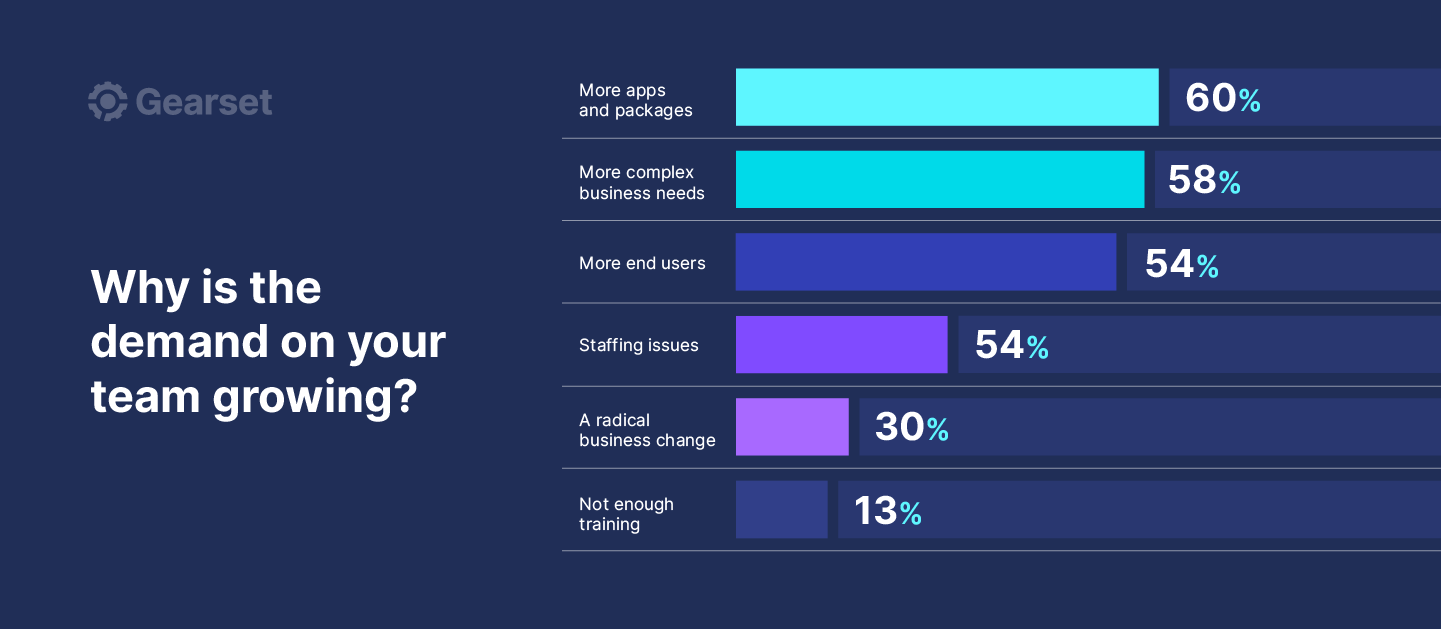Across different teams of all shapes and sizes, most Salesforce folk agree that their work has become more complex. Collating the data from the 2023 State of Salesforce DevOps Report revealed clear trends in the causes of this increased demand.

However, diving into the answers given by those in different roles revealed that distinct positions are identifying different causes of this rising complexity. It’ll be hard for teams to overcome growing demands without a consensus on where these demands are coming from. In this post, we’ll assess the leading causes of rising Salesforce complexity, and highlight which roles feel these pain points.
Standardizing Salesforce delivery in Manufacturing: Lessons from a release team
All roles face pressure from the wider business
It’s clear that businesses are increasing their reliance upon Salesforce for core functions, with 85% of respondents disclosing that it had become more critical to the business in the last year. This reflects the versatility of Salesforce’s systems, which can enable business-critical processes for marketing, sales and customer services.
While this helps businesses to unlock more value from their investment in Salesforce, the other side of this coin is the increased pressure Salesforce development teams have felt over the last year — with 90% reporting that the demands on their team had risen.

Regardless of role, a key demand on Salesforce teams was named as more complex business needs. It’s clear that as Salesforce becomes more integrated in core business functions, Salesforce teams will be faced with increased demands.
Admins struggle with the rising number of Salesforce end users
Though only half of respondents across all roles reported that the number of Salesforce end users had increased over the last year, over three quarters of admins highlighted this as a key demand in their responses. A rise in the number of Salesforce end users increases both the volume and complexity of administrators’ workload.
Business as usual for administrators may come under strain with more end users. There will be more demand on administrator time as they’ll need to provide training sessions for new end users. Further, there’ll be more routine user requests for administrator support.
An increased number of Salesforce end users also necessitates new processes. With more end users, there may be performance issues on the Salesforce instance that cause slow page load times or system crashes. Administrators will need to establish new systems to counteract these downtimes. Similarly, there may be a need for new data management systems, purely because the growing number of end users creates more data.
Developers face technical demands
The increased demands from the wider business demand will increase the amount of customized technical work for developers. Almost two-thirds of developers reported that in the last year they had faced an increased demand for integrations and custom code, which was only noted by under half of respondents in other roles.
There have been increased demands for integrations between Salesforce and other applications, to streamline business processes by allowing access to multiple systems in one place. This is no simple task — different systems will need to be integrated through different methods, with some being through APIs but others through middleware. Establishing effective integrations will be a complex process for developers.
Developers also face increased demand for custom code to meet unique business requirements. For example, custom scripts may be needed to calculate product discounts. As this will be highly dependent on business-specific circumstances, this could require bespoke and creative solutions from developers.
Both of these challenges may stem from an increased number of end users and more complex business needs, but it’s clear that it is developers feeling the pain of custom built solutions and integrations.
Leaders face cultural challenges
The increased business demands affects those at the top, too. Leaders are concerned by the staffing issues that have developed over the past year. As the business’ demands upon Salesforce increase, skill gaps became readily apparent. Managing upskilling and new hires to fill these gaps will be a complex, costly and time consuming process. There may also be a general need to increase the size of the Salesforce team to handle increasing workloads, which will increase pressure upon the hiring process.
As admins and developers have expressed the challenges that they face with the increased complexity of their jobs, leaders will have more work to manage these moving parts. There’s also an increased risk of burnout and conflict within the workforce with these increased workloads, and leaders will need to work to maintain the wellbeing and productivity of their staff.
Cloud and package adoption
With more teams reporting that they will be extending their use of clouds and packages, Salesforce will only continue to take on more business-critical operations and become increasingly complex. The clouds predicted to have the greatest growth in 2023 are Vlocity, CRM Analytics, Mulesoft and Experience Cloud.
Extending to cover other Salesforce clouds will increase demands on all roles. Developers will have to invest time and resources into the initial configuration of each cloud, which will involve wrestling with its nuances. Optimizing each cloud’s data model and upskilling end users for the new cloud will also be a complex task for administrators. Salesforce leaders will need to navigate between the wider business needs and the needs of their development team — discussions of costs, time needed to set this up, and value added will be critical.

So what’s the solution?
With Salesforce teams spending an average of nine hours each month deploying outside of their contracted working hours, rising Salesforce complexity has a clear impact on the working patterns and demands of teams. Further, with no clear consensus on the causes of this complexity, teams may struggle to appreciate how and why different roles are facing higher workloads and blockages.
Thankfully, there’s a solution that can aid teams in tackling rising Salesforce complexity — from technical to cultural demands.
Organizations now realize DevOps is a necessity to really understand how to streamline their operations and focus on value-driving changes. Francis Pindar, Salesforce Expert
DevOps began as an approach to the culture of software engineering. It aims to integrate development and operations teams, so that changes are released frequently and monitored constantly. This creates a strong feedback loop, allowing development teams to quickly respond to the feedback of end users.
As DevOps focuses on breaking down the silos between roles, it is a useful approach for Salesforce teams struggling to find any consensus on the causes of or solution for the rising complexity of their work. The increased levels of communication within DevOps teams should ease the struggles to relate to and appreciate the pain points of other roles. This will not only help to streamline business processes, but will help to foster a collaborative culture — allowing your team to communicate their capacity and overcome complexity together.
Adopting DevOps will also aid teams in tackling rising technical complexity. Rather than overcoming the challenges of custom development and user requests through huge releases, DevOps allows teams to release these in small increments. This reduces the risk of running into technical errors and allows teams to continuously react to feedback from users.
There’s no rush with implementing your own DevOps process — it’s better to slowly and steadily improve your procedures. Even small steps towards a DevOps process can drastically improve team performance and foster strong collaboration within your team.
Start tackling complexity
No matter your role, team size or industry, tackling Salesforce complexity is a challenge. With DevOps, the rising technical and cultural challenges can be managed through small and frequent releases, and a more collaborative team culture. If your team is struggling with rising Salesforce complexity, book a consultation with one of our DevOps experts for tailored advice.
To get the full insight into current Salesforce and DevOps trends, download our complete report on The State of Salesforce DevOps.



